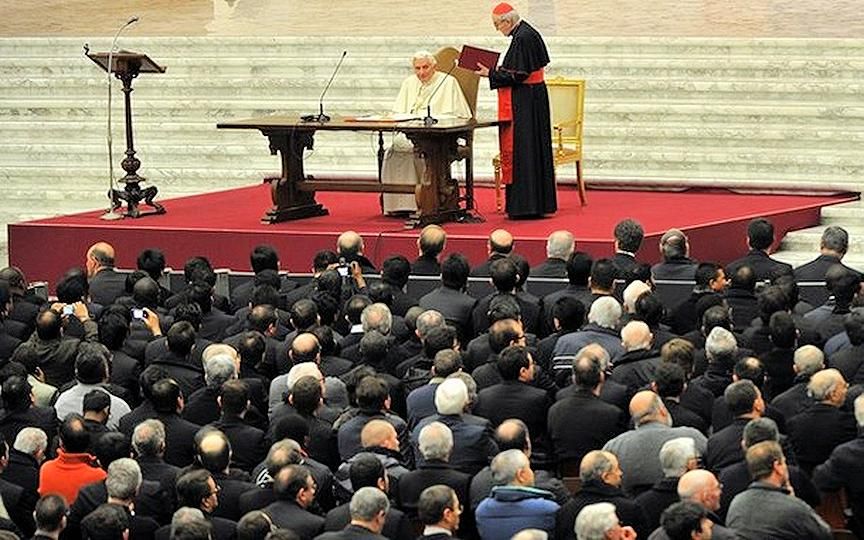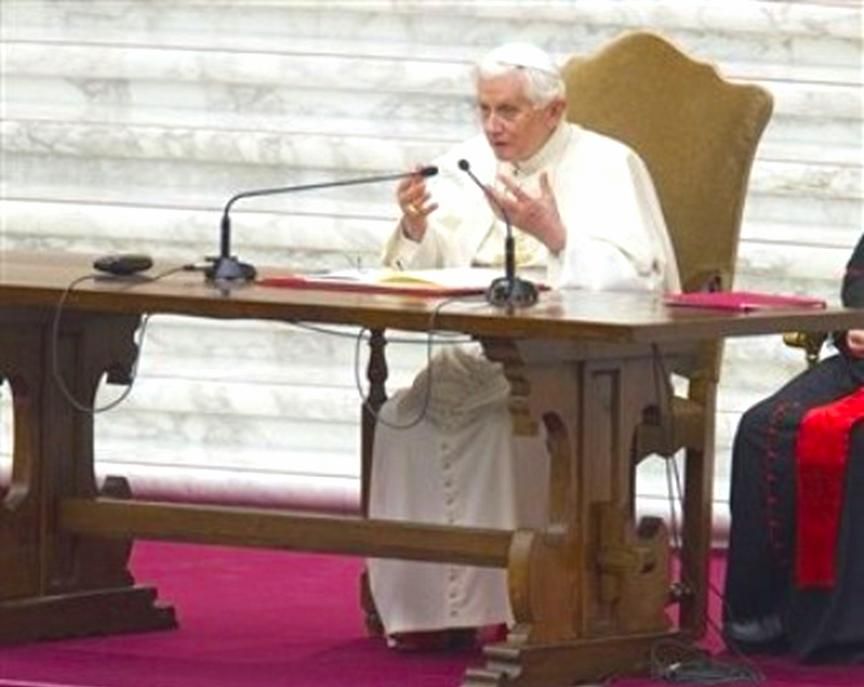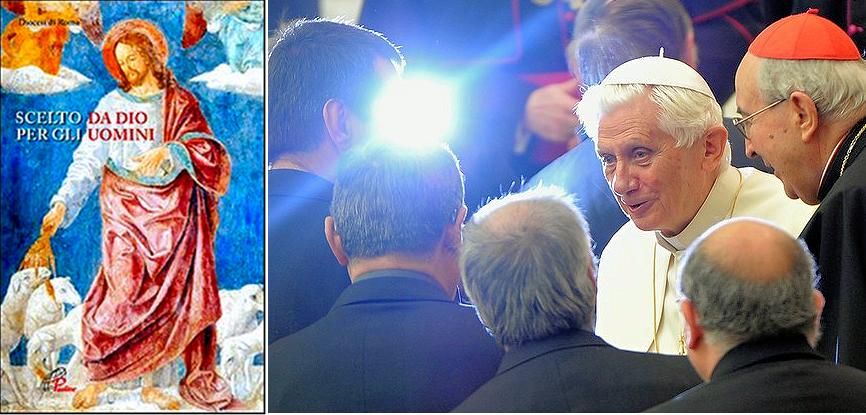 Chapter and verse:
Chapter and verse:
Pope uses Bible reflection
to address 'his' priests
By Cindy Wooden


VATICAN CITY, February 23 (CNS) -- Speaking 38 minutes without a prepared text, Pope Benedict XVI gave priests of the Diocese of Rome a look not only at how he approaches Scripture, but also at his priorities and personality.
Addressing the Rome priests as "my clergy," the Pope led them Feb. 23 in a reflection on faith, truth, hope and humility.
Sitting behind a table and talking without a text -- throwing in explanations of Greek words, Scriptural references and trends in modern theology -- the Pope used Ephesians 4:1-16 as a framework for reflecting on the problems facing the Church and on the way priests should respond to them.
Until last year, the Pope's annual Lenten meeting with the priests of Rome was an opportunity for them to ask him questions. But in 2011, he chose to move to the format of "lectio divina" -- reading a Scripture passage together and then going through it almost line by line to draw lessons and inspiration.
The question-and-answer format was used frequently by Blessed John Paul II in meetings with priests and seminarians, giving him a chance to hear their problems and concerns.
[I have not had a chance to look through the 26 years of John Paul II's Pontificate but this assertion by Wooden surprised me. I was under the impression that Benedict XVI pioneered this encounter form when he met the priests of Val D'Aosta during his first summer vacation as Pope in July 2005. Failing to find any results by searching 'john paul II encounters with priests and seminarians' in English and in Italian, I checked out a few years at random on the Vatican webpages about John Paul II's annual meetings with Roman priests (2008, 1998, 1987 and 1980) and I only found standard addresses, not Q&A; so I do not know where Wooden's information came from. I will be most happy to be proven wrong.]
At the beginning of his pontificate, Pope Benedict
kept up the tradition; but especially after the 2008 Synod of Bishops on the Bible, the Pope began using the "lectio divina" format more often to let the Bible guide discussions with clerical groups.
The Pope's talk to Rome priests and his off-the-cuff "lectio divina" sessions Feb. 15 with Rome seminarians and in September with seminarians in Germany included references to the Hebrew, Greek or Latin versions of the biblical passage, as well as the commentaries of ancient church fathers, especially St. Augustine.
Usually, aides prepare at least the initial draft of papal speeches and homilies, so the fact that the Pope addressed the priests and seminarians without reading from a text gave them a greater sense of the way he thinks and approaches Scripture and the challenges facing the Church.
The Pope did not ignore the difficulties of being a priest today, but said he and his fellow priests must strive to live as St. Paul admonished the Ephesians, "with all humility and gentleness, with patience, bearing with one another through love."
The Pope used the pronoun "we" throughout his speech, saying the way he and the priests live their lives will determine their ability to help others believe in Jesus and follow God's will.
"The great suffering of the Church today in Europe and the West is the lack of priestly vocations. But the Lord is always Calling - what is lacking is listeners," the Pope said. "We have listened to his voice," he told the priests, "and we must always be attentive to the Lord calling others, helping them listen and accept the call."
The Church's pastors must imitate St. Paul's style in teaching and encouraging people, using "the loving invitation of a father or mother," and not "a moralistic admonition," Pope Benedict said.
Priests, bishops and even the Pope also must be humble, which does not mean being a doormat, but accepting the fact that while "we are small" in the grand scheme of things -- "I am just one thought of God," - God entrusts each person with a special gift for the good of the entire community.
"The little humiliations we endure day by day are salubrious," he said, because they help one maintain a balance between knowing he us unique and knowing he is just one of the billions of unique creatures God formed and called.
"To accept this, to learn this and accept my position in the Church" means to recognize "my little service as something great in the eyes of God," he said.
"The absence of humility destroys unity," the Pope said, because it feeds pride, competition, a search for power and the denial of the gifts of others.
Another major problem in the Church today highlighted by the Pope was "religious illiteracy," a lack of knowledge about what the Church teaches and why.
"With this illiteracy we cannot grow, unity cannot increase. So we ourselves must recover this content as a richness for unity -- not as a package of dogmas and commandments, but as a unique reality that reveals itself through its depth and beauty," he said.
"We will renew the Church only if we renew people's knowledge of the faith," he said, which is the chief reason why he said he proclaimed the Year of Faith and why it is important for Catholics to know the Catechism of the Catholic Church.
The Letter to the Ephesians calls Christians to a mature faith, which many people today believe means being "emancipated" from the church and its teachings, the Pope said. But without a firm anchor to the faith and knowledge of what it teaches, they are tossed by "the waves of the world, by the opinions of the world (and) by the dictatorship of the media."
In the absence so far of a transcript to work with, here in the meantime is another account...
The Pope to Roman priests:
'Lack of humility destroys
unity within the Church"
by Alessandro Speciale
Translated from

23/02/2012
For the second time in two days, Pope Benedict XVI spoke of evil in the Church, directly admonishing the clergy.
He did this yesterday morning during the General Audience, during which he reflected on the significance of Lent; and today, in his annual Lenten meeting with the priests of Rome.

An encounter which, this year as last year, took the form of a lectio divina on a passage in the Bible, instead of the Q&A that had characterized the meeting for years. The Pope spoke for 40 minutes without notes on a passage from Ephesians 4 (1-12).
His point of departure was "the great suffering of the Church in Europe and the West today because of the lack of vocations". it is a decline not because God has stopped calling for vocations, the Pope underscored, but because few are responding.
Therefore, he said, Catholics must be more attentive to the voice of the Lord and cultivate the virtues necessary to accept the call: humility, gentleness and magnanimity.
And it was while reflecting on the concept of humility that
the Pope spoke in the first person to launch his exhortation to the men of the Church: To be humble, resisting the temptation of pride, also means "to accept my place in the Church, my small service as great in the eyes of God - the kind of humility and of realism that makes us free".
[But this is a rhetorical practice he often uses - to shift to the first person when speaking about things that come directly from his experience as a priest! it seems so obvious from everything he says that he feels his profound and fundamental identity to be a priest.]
"The absence of humility destroys unity", he went on. "Humility is a fundamental virtue for unity.; only in humility can the Church as the Body of Christ grow".
The Pope also referred to what he considers another key problem in the Church today, what he calls 'religious illiteracy', against which the Pope has announced a Year of Faith.
The contents of the faith, he told the priests, should be better known, "not as a package of dogmas and commandments, but as a unique reality which must be disclosed in its profundity and beauty".
Nut he also warned against those who claim to have an 'adult faith' because 'emancipated' from the teachings of the Church and having little to do with the doctrine of the Church.
In fact, he said, the result is not an adult faith but "a dependence on what's in vogue in the world, on the opinions of the world, on the dictatorship of the mass media and their insistence on opinions that most people think and want".
"True emancipation", he said, is the consequence of liberation from this dictatorship of opinion, "in the freedom of the children of God who believe together" in the Body of Christ, which is the Church.
The Pope also admonished those theologians who, while noting the presence and the power of evil in the world, also doubt the omnipotence of God. But in the end, he said, "it is not the power of evil that remains. Only God".

During the meeting, the Pope gave each priest a copy of the book entitled
Scelto da Dio per gli uomini (Chosen by God for men), with an introduction by the Cardinal-Vicar of Rome, Agostino Vallini.
The Pope called it 'a rule of life', one of the results of the Year for Priests, to serve as " an ideal guide for priests so they may grow in the joy of their vocation and the unity of the priesthood".
[Modificato da TERESA BENEDETTA 24/02/2012 06:37]